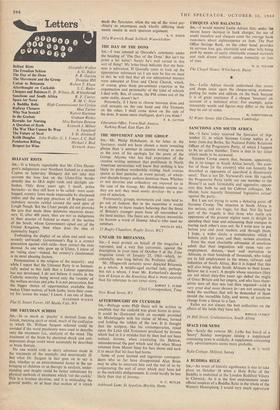SIR,—I have today received the Spectator of Sep- tember 11,
in which Suzanne Cronje replies to a letter from Jan Botha, the National Public Relations Officer of the Progressive Party, of which 1 happen to be an active member. There is that in her letter which needs to be answered.
Suzanne Cronje asserts that, because, apparently, she is no longer in South Africa herself, 'the num- ber of those [in the country] who can honestly be described as opponents of apartheid is disastrously small.' That is not Dr. Verwoerd's view. He regards the Progressive Party (with our one member in the House!) as such formidable and aggressive oppon- ents that both he and his Cabinet colleague, Mr. Maree, have recently threatened 'legislative action' against the party.
But I am not trying to score a debating point off Suzanne Cronje. The situation in South Africa is too serious, and too tragic, for that. Not the least part of the tragedy is that those who really are opponents of the present regime seem to delight in spending their time and exhausting their energies in tearing each other's eyes out. So I write now to put before you and your readers, and through them, I hope, a wider circle, a consideration which I believe calls for your, and their, serious attention.
Even themost charitable advocates of sanctions admit that their imposition will cause vast un- employment, distress, want and starvation to Africans, in their hundreds of thousands, who today are in full employment in the mines, railways and industries of South Africa. But it is hoped that this will also bring white South Africans to their knees. Believe me it won't. A people whose ancestors (they are not mine) sixty-five years ago defied the might of Great Britain and her empire, and who have them- selVes seen all that was lost then regained—with a very great deal more thrown in—are not unready to make the sacrifices that will be demanded of them should the incredible folly, and worse, of sanctions change from a threat to a fact.
Exiles are not always the best authorities on the affairs of the lands they have left.
RONALD CURREY


































 Previous page
Previous page